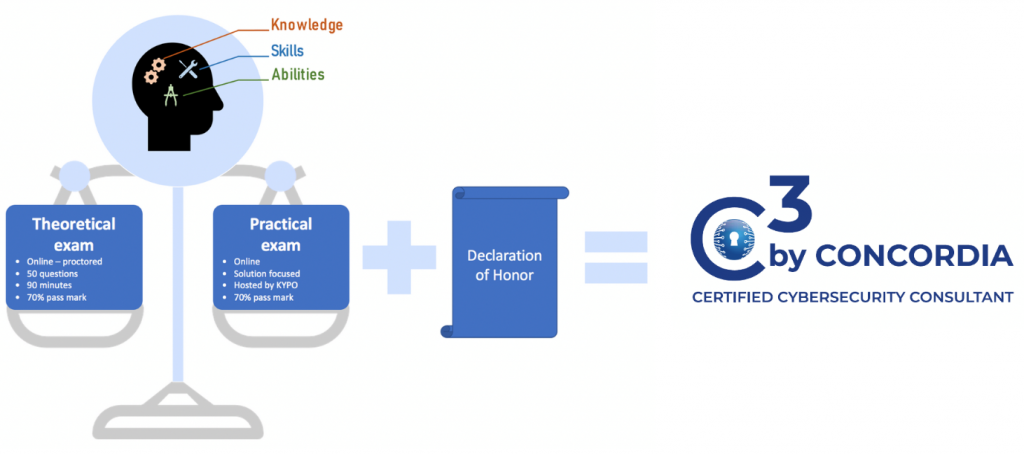An experience of becoming a Certified Cybersecurity Consultant (C3 by CONCORDIA)
Within the CONCORDIA project, C3 by CONCORDIA certification was developed for European cybersecurity professionals who want to have their knowledge and skills validated with a certificate. In this blog post, I will describe my experience of how I gained the certificate, and I hope it could help someone else with the decision to apply for the certification.

I participated in the first pilot of the C3 by CONCORDIA certificate. In the first stage of the whole certification scheme, there is a course divided into two parts – the first one is an online module on a MOOC platform, open for about one month and requires about 3 hours per week of engagement. An advantage of this part is that the module is available throughout the month, and a participant can choose their own time to listen to many experts in the field of cybersecurity. After some lectures, there are also closed-questions quizzes with questions regarding a specific topic that you listen to before that. The course was divided into four modules: cybersecurity principles, offensive methods, defensive methods and risk management. In each section, very interesting lectures took place where a participant could either refresh their knowledge or receive some new knowledge.
After receiving the required number of points in the MOOC, a participant could take part in the second part of the course, an online live module that took three afternoons. This part of the course was interactive and involved hands-on exercises for the previously gained theoretical knowledge. I have to say I enjoyed this part a lot and learned some new things. On the last day of the online module, the further procedure of certification was also presented.

After taking part in both parts of the course, you can apply for certification, again set in two parts. The first part is a theoretical exam, which is done online on a platform, and you are being supervised. The second part is the practical exam which is again online and done on a KYPO cyber range platform. The knowledge received from the online live module can be used in this part of the exam. A participant needs to get at least 70 % of the points in both parts.
If you pass both parts, you must sign a declaration of honour and receive a certificate on a blockchain-based solution for certificate management and verification, EduCTX. The certificate is valid for two years.
I enjoyed taking part in the certification, and I believe that everyone can learn a lot through the course and get a certificate for recognition of their knowledge. I believe that with this certificate I have proof of knowledge of cybersecurity and can use it to show that I am a trained professional and have the skills needed for a cybersecurity consultant. I honestly encourage cybersecurity professionals to apply for the Certification which could also help with their future job search. Based on the statements of other participants in the pilot, I believe everyone was very satisfied with the Certification process: https://www.concordia-h2020.eu/news/the-pilot-course-becoming-a-cybersecurity-consultant-just-closed-whats-next/.
(By Lili Nemec Zlatolas, University of Maribor (UM))
